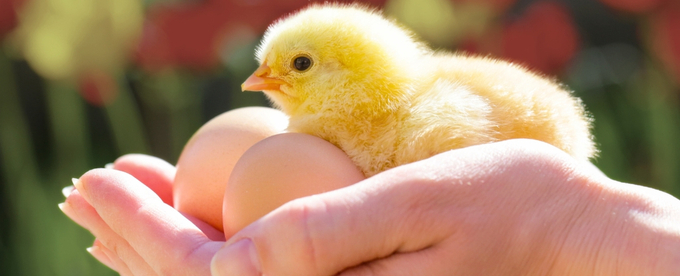May 21, 2025 | 05:05 GMT +7
May 21, 2025 | 05:05 GMT +7
Hotline: 0913.378.918
May 21, 2025 | 05:05 GMT +7
Hotline: 0913.378.918
Billions of male chicks are routinely culled by being crushed alive or gassed at hen hatcheries worldwide.

Triocean/Canva Pro
Chick culling arises from the fact that chicks from egg-laying hens are not typically used for meat production, leading to the annual culling of about 7 billion male chicks one day old.
Although some countries are stamping out these practices, scientists are also working to develop new methods for screening eggs before they hatch so they don't go to waste. A new study shows how 'sniffing' eggs using a modified version of a commercial egg-handling suction cup can reveal their sex.
In a new study, scientists from the University of California, Davis, and SensIT Ventures Inc. – a startup company also based in Davis – found they could detect the sex of fertilized chicken eggs earlier and faster than other methods in development by "sniffing" chemicals released through the shell.
"We found that there are volatile chemicals from the egg, a scent that you can capture and sort statistically," says senior author, biologist, and plant pathologist Tom Turpen. He is also the CEO of SensIT Ventures.
By using their specially developed silicone suction cups to extract these volatile organic compounds (VOCs), Turpen and his colleagues could accurately determine the sex of the embryos 80 percent of the time. They could do this after only eight days of incubation and using just 2 minutes of sampling.
Both of the current methods for determining the sex of chicken embryos before they hatch have their limitations. One process entails making a tiny hole in each egg's shell and extracting a fluid sample.
The other uses hyperspectral imaging to peer inside the egg and spot the embryo. Although this imaging system is reliable, it is only useful after the embryo has reached a late stage of development, and the fluid-sampling system is rather pricey, which likely discourages its use.
Evolution has endowed the eggshell with a complex, porous structure to ensure adequate gas exchange, physical integrity, and hatching success. Earlier studies showed that biological information is carried in the form of VOCs released through the eggshell of some species.
A recent study extracted "sex-specific" volatiles from chicken eggs using a method that took one hour of sealing in special containers. The group emphasizes that their new sampling system enables quicker collection of egg VOCs, which makes it more practical for industrial use.
The researchers suggest this method can be refined, and it may eventually be able to work with existing automation infrastructure. Rapid suction-cup sampling could be performed in rows to test lots of eggs at once.
"We think that the hardware platform invented at UC Davis could be integrated into hatcheries," Turpen says.
The world's population hit the 8 billion mark last year, and we desperately need new technologies and changes in human behavior to feed everyone and rectify the damage caused by food production and food waste.
The authors add that the poultry industry has come a long way in terms of meeting consumer demand for eggs while also significantly reducing its negative effects on the environment.
Overall, it seems this method of sniffing out VOCs in eggs holds promise for developing a practical and efficient way to determine the sex of embryos and address some more of the challenges faced by the industry.
Sounds like a better future for chicks and humans.
(sciencealert)

(VAN) Attempts to bring down the price of the Japanese staple have had little effect amid a cost-of-living crisis.

(VAN) Fourth most important food crop in peril as Latin America and Caribbean suffer from slow-onset climate disaster.

(VAN) Shifting market dynamics and the noise around new legislation has propelled Trouw Nutrition’s research around early life nutrition in poultry. Today, it continues to be a key area of research.

(VAN) India is concerned about its food security and the livelihoods of its farmers if more US food imports are allowed.

(VAN) FAO's Director-General emphasises the need to work together to transform agrifood systems.

(VAN) Europe is facing its worst outbreak of foot-and-mouth since the start of the century.

(VAN) The central authorities, in early April, released a 10-year plan for rural vitalization.